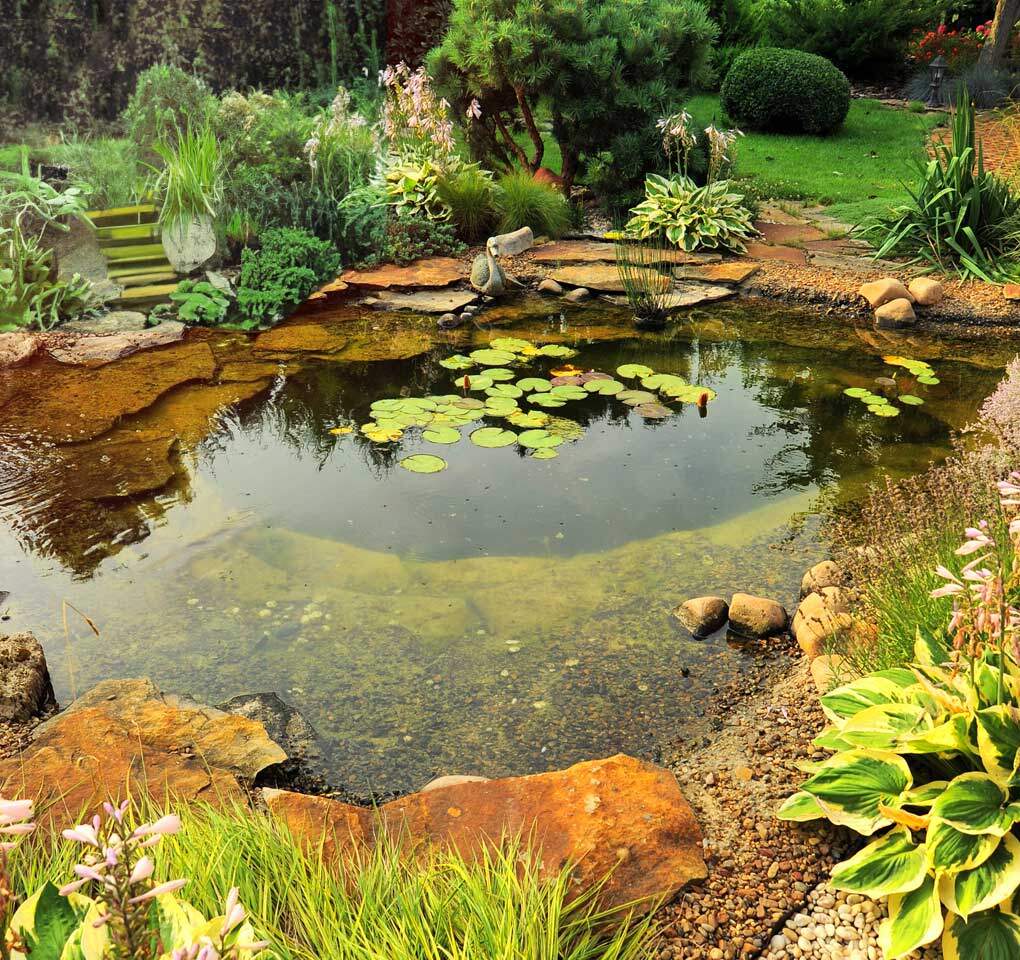Understanding Pond Sludge and Its Impact on Your Pond’s Ecosystem
 Pond sludge is formed when leaves, grass clippings, and other organic matter fall into the pond and settle at the bottom. Inorganic matter like soil and sand can also accumulate, further exacerbating the problem. As the organic matter decomposes, it releases nutrients into the water, which can lead to an overgrowth of algae and other aquatic plants.
Pond sludge is formed when leaves, grass clippings, and other organic matter fall into the pond and settle at the bottom. Inorganic matter like soil and sand can also accumulate, further exacerbating the problem. As the organic matter decomposes, it releases nutrients into the water, which can lead to an overgrowth of algae and other aquatic plants.
It is important for pond owners in the Rochester and Western New York and Pennsylvania area to know that the buildup of pond sludge can have several negative effects on your pond’s ecosystem and the importance of regular pond maintenance to keep your pond clean and healthy. One of the most significant problems is the depletion of oxygen levels. As organic matter decomposes, it consumes oxygen, thereby leading to low oxygen levels in the pond. This can cause fish and other aquatic creatures in your pond’s ecosystem to suffocate and die.
Another significant problem is the overgrowth of algae and other aquatic plants in your pond. The nutrients released by decomposing organic matter can generate unhealthy levels of nutrients, thereby causing an overgrowth of undesirable plants in your pond, which can make the water cloudy, murky and less than healthy to be in or near.
Finally, pond muck and sludge on the bottom of your pond can release harmful toxins into the water, which can be dangerous for humans and animals. These toxins can cause skin irritation, respiratory problems, and other health issues, including death.
Related: Toxic Algae Blooms – What They Are and How to Test for Them
Manual Methods for Removing Pond Sludge
One of the most common ways to remove pond sludge is manual removal. This involves physically removing the sludge from the bottom of the pond using a rake or a pond vacuum. Manual removal is a labor-intensive process and can be time-consuming, especially if the pond is large.
Another method is dredging, which involves using a mechanical device to remove the sludge from the bottom of the pond. This is a more expensive method and is typically reserved for larger ponds.
How to Use Probiotics, Beneficial Bacteria & Enzymes to Remove Pond Sludge
Probiotics and Beneficial Bacteria can also be extremely effective in removing pond sludge and muck from the bottom of ponds. Probiotics are in fact beneficial bacteria that can break down organic matter, while enzymes are proteins that can speed up chemical reactions.
Probiotics and enzymes are available in liquid or powder form and can be added directly to the pond. They work by breaking down the organic matter in the sludge, which releases nutrients into the water. This can help to reduce the overgrowth of algae and other aquatic plants.
Benefits of Using Barley Straw for Pond Sludge & Muck Removal
Barley straw is another natural method for removing pond sludge. Barley straw works by releasing natural chemicals into the water that can break down the organic matter in the sludge. This can help to reduce the overgrowth of algae and other aquatic plants.
Barley straw is available in bales or pellets and can be added directly to the pond. It is a safe and effective method for removing pond sludge and is often used as an alternative to chemicals.
In addition to removing pond sludge, barley straw can also be used to remove pond muck. Pond muck is a layer of sediment that accumulates at the bottom of the pond. It is composed of dead plant material, fish waste, and other organic matter.
Barley straw works by releasing natural chemicals into the water that can break down the organic matter in the muck. This can help to reduce the overgrowth of algae and other aquatic plants.
Preventing Pond Sludge Buildup
Preventing pond sludge buildup is essential for maintaining a healthy pond ecosystem. One of the best ways to prevent sludge buildup is to remove organic matter from the pond regularly. This can be done by using a skimmer net to remove leaves and other debris from the water’s surface.
Another way to prevent sludge buildup is to limit the number of fish in the pond. Fish produce waste, which can contribute to the buildup of sludge.
Tips for Maintaining a Healthy Pond Ecosystem
Maintaining a healthy pond ecosystem requires regular maintenance. In addition to removing organic matter from the pond, it is also essential to test the water regularly. Testing the water can help to identify any imbalances in pH levels, oxygen levels, or nutrient levels.
It is also important to add beneficial bacteria to the pond regularly. Beneficial bacteria can help to break down organic matter and reduce the buildup of sludge.
Professional Pond Cleaning Services
Professional pond cleaning services can be a valuable resource for pond owners. These services can provide a thorough cleaning of the pond, including the removal of sludge and muck.
Professional cleaning services can also test the water and make recommendations for maintaining a healthy pond ecosystem.
Common Mistakes to Avoid When Removing Pond Sludge
One of the most common mistakes when removing pond sludge is using chemicals. Chemicals can be harmful to the pond’s ecosystem and can cause more harm than good.
Another mistake is not removing enough sludge. It is essential to maintain a regular pond maintenance schedule to remove as much sludge as possible to prevent future buildup. Preventing future pond muck and sludge buildup requires ongoing pond maintenance. Regularly removing organic matter, testing your pond’s water, and adding beneficial bacteria can help to keep the pond healthy and free of sludge.
The Importance of Regular Pond Maintenance to Prevent Sludge Buildup
Regular pond maintenance is essential for preventing sludge buildup. This includes removing organic matter, testing the water, and adding beneficial bacteria to keep your pond clean and healthy.
It is also important to limit the number of fish in your pond and to avoid overfeeding them. Fish produce waste, which can contribute to the buildup of unhealthy levels of pond sludge and muck.
Professional Pond Cleaning Services – Rochester, NY
National Pond Service in Rochester, New York offers experienced, comprehensive pond cleaning services to clients throughout the Rochester, Buffalo, Syracuse and Southern Tier areas of New York as well as Pennsylvania, New Jersey, Connecticut and Ohio. Effective pond cleaning and maintenance involves regularly scheduled, thorough testing and cleaning of your pond, including the removal of sludge and muck. Our comprehensive pond cleaning and maintenance services also include testing your pond’s water and offering pond maintenance recommendations for maintaining a healthy pond ecosystem. We regularly maintain our client’s ponds, typically on a bi-annual basis or as requested or needed.
The Importance of Maintaining a Clean Pond
Maintaining a clean, healthy pond is essential for the health of your pond’s ecosystem as well as the health of the fish who live in your pond. Preventing sludge buildup requires ongoing maintenance, including removing organic matter, testing the water, and adding beneficial bacteria.
Manual removal, probiotics and enzymes, and barley treatments are all effective, natural, and ecologically friendly methods for removing pond sludge and muck from the bottom of your pond. Professional pond cleaning services can provide a thorough cleaning of the pond and make recommendations for maintaining a healthy ecosystem.
By following these tips, pond owners can maintain a clean and healthy pond that can be enjoyed for years to come. If you have questions regarding how you can keep your pond clean and healthy, we encourage you to contact us.





